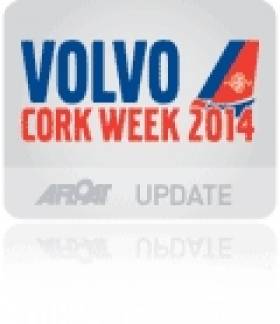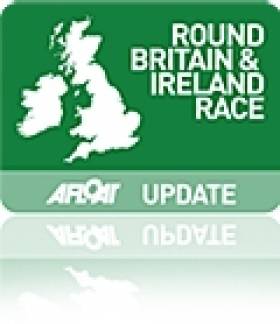Displaying items by tag: Louay Habib
RORC Keelboat Masterclass with Andrew 'Dog' Palfrey
Two-time Etchells World Champion, 5.5 Metre World Champion and Olympic sailor - Andrew Palfrey delivers a keelboat masterclass in an interview for RORC.
Andrew has coached World Championship-winning teams in the Farr40, Farr30, RC44, Etchells and Star class. In recent years Palfrey has coached a wide variety of teams from Maxis to Quarter Tonners.
For the RORC Time Over Distance Series Andrew presents a live interactive show covering planning, goal setting, teamwork and equipment. The presentation also covers increasing performance through speed, starts, and also upwind and downwind techniques.
#corkweek – Thrilling conditions welcomed an international fleet of yachts from all over Europe and the United States to Volvo Cork Week. 100 yachts racing in Cork Harbour produced a magnificent spectacle writes Louay Habib. Cork Harbour is one of the largest natural harbours in the world and provides stunning scenery and tricky wind and tidal conditions. The gusty north easterly breeze tested the boat handling skills of the international fleet, with several yachts reporting a boat speed of up to 20 knots on the surf.
The first race of Volvo Cork Week started just outside Roches Point, the wind speed piped up to 17 knots with a short sea state. The beat into Cork Harbour had the fleet swapping tacks past Spike Island, before negotiating close tight reaching legs along the picturesque town of Cobh. For many it was a race of over three hours, before returning to the Royal Cork Yacht Club to enjoy the full facilities of the exclusive race village.
Michael Boyd racing Grand Soleil 43, Quokka (Royal Irish YC) had an outstanding race, winning IRC Two by a landslide 15 minutes on corrected time. Tony Ackland's Dubois 37, Dark Angel (Swansea YSC) was second in IRC Two, just seven seconds ahead of Jim Macgregor's Elan 410, Premier Flair (Poole YC), which made an impressive comeback after starting prematurely.
For Volvo Cork Week, Mark Mansfield (Royal Cork YC) is at the helm of Quokka. Mark sailed at four consecutive Olympics from 1992 to 2004, for Ireland, in the International Star Class.
"We got a great start, there was a wind shift just before the gun, which favoured the pin end and we had a nice approach and tacked soon after into clear air." Explained Mark. "The wind speed was up and so was the sea state and Quokka just loves those sort of conditions. Heavier than the Ker 40s, she goes well through the waves but downwind Quokka doesn't plane, so the Ker 40s got away. The crew work today was very good, especially after some last minutes calls; it's obvious that this team has been training well together for the Commodores' Cup."
Anthony O'Leary's Ker 39, Antix (Royal Cork YC) started well and played the current and the wind acceleration through Roches Point to lead on corrected time at the top mark off Cobh. Marc Glimcher's Ker 40, Catapult (Baltimore SC) helmed by Royal Cork's Olympian Peter O'Leary, took Line Honours by 27 seconds from Richard Matthews' Hakes 42, Oystercatcher XXX (Royal Burnham YC) . However, after time correction, Antix won the class by less than a minute from Catapult with Andy Williams' Devon based, Ker 40, Keronimo in third.
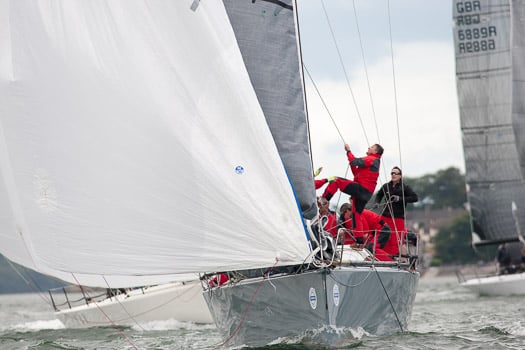
Victory in IRC Three went to Pat Kelly's J/109, Storm (XXYC). Paul O'Higgins Corby 33, Rockabill V took line honours but after time correction Storm won by nearly three minutes from Robert McConnell's A35, Fools Gold with Rockabill V third.
The IRC Four Class winner for 2012 was in fine form today. former Royal Cork YC Admiral, Peter Deasy driving Bad Company scored a slender win from Paul Tingle's Corby 25, Alpaca (Royal Cork YC). Tim Cunliffe and his team from Falmouth, racing Half Tonner, Insatiable was third.
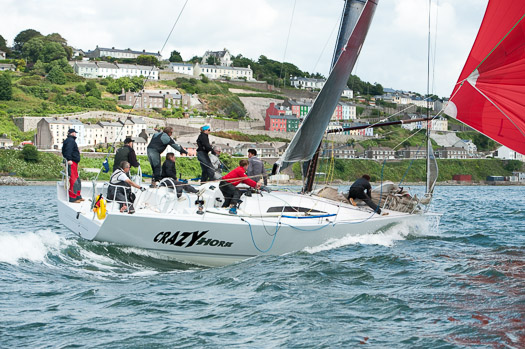
Bad Company won by just 49 seconds on corrected time. "Beautiful conditions and a really competitive race, what a great start to Volvo Cork Week." Smiled Peter Deasy. "We are delighted to see Insatiable back, we had a great battle with them last time and Paul's new boat, Alpaca, is sailing very well indeed, so we will have to be at our best to win this class."
It was a long day on the water in IRC Five, Jason & Domonic Losty's Quarter Tonner, Illes Pitiuises was the winner by just under five minutes from Dave Lane & Sinead Enright's J/24, YaGottaWanna. Christine Willis's Westerly Fulmar, Rodmar was one of the last yachts to finish today, after over four hours of racing, the team from Aberaeron SC showed great tenacity taking third in class after time correction.
In White Sail IRC One, Bryan Hefferan's Dufour 36, Aisling (Royal Cork YC) took Line Honours and the class win on corrected time from John Downing's Sunfast 32, Samba. Peter O'Donavan's X-372, Xtension (Royal Cork YC) was third.
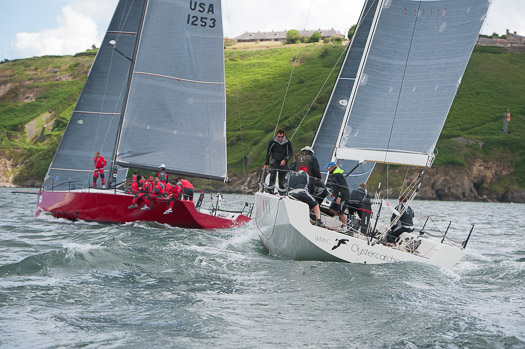
In the Sportsboat Class, Robin & Ben O'Mahony's 1720, Spiced Beef was the winner with Mike Relling's Viper 640, Viper taking second place and David Pitman's Viper 640, The Black Adder was third. Viper could have won the first race but for a navigational error. "We over stood a mark, which cost us the lead and ultimately the race." Admitted Viper's skipper, Mike Relling. "We had a real blast though, hitting 19 knots on the reach and it has been great to race against the 1720s. They definitely have us upwind but downwind the Viper is much quicker, so we expect a regatta-game of snakes and ladders, pardon the pun!" David Pitman's Viper 640, The Black Adder was third.
After racing, hundreds of competitors enjoyed a few glasses at the Royal Cork Yachjt Club with live entertainment. The SLAM Crew Games kick off tonight in the Marquee with a giant screen showing the FIFA World Cup Semi-Final between Brazil and Germany. Racing continues at Volvo Cork Week tomorrow Wednesday 8th July, with the international fleet enjoying a variety of courses both inside and outside of Cork Harbour.
For full results here
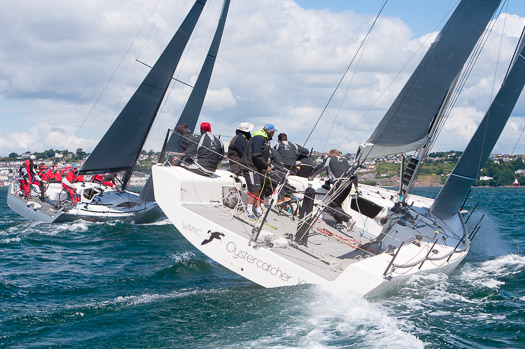
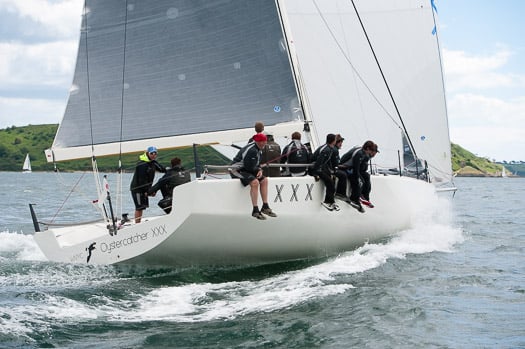
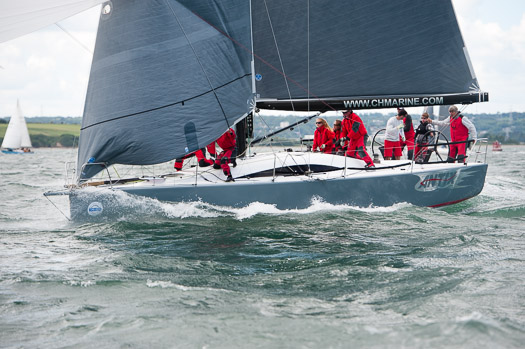
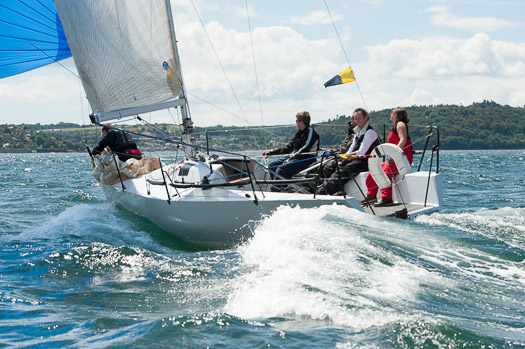
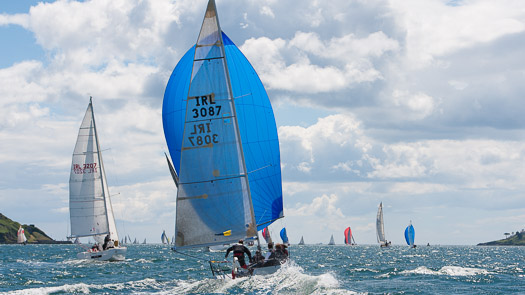
Heading Home in Round Britain and Ireland Race
By sunset tonight all of the competitors racing in the Sevenstar Round Britain and Ireland Race will have rounded Muckle Flugga. For many of them it has been a long hard slog up the North Sea writes Louay Habib.
The leaders are literally at the other end of the course. At 1200 BST, Volvo Open 70, Groupama is just 65 miles from the Scilly Isles. They have chosen a course north of the rhumb line, presumably to take advantage of any new breeze that may emanate from the Bristol Channel. Teléfonica has gybed south and it is anticipated that Groupama will cover them. Groupama have 290 miles to go to the finish of the Sevenstar Round Britain and Ireland Race; Teléfonica are 20 miles behind. Both are expected to finish in Cowes by Sunday afternoon. Obviously this estimated time of arrival will be dependent on the wind strength.
The overall lead under IRC has changed yet again, Piet Vroon's Ker 46, Tonnerre de Breskens is back in the lead. The Dutch yacht is blasting down the west coast of Ireland trying to hang on to the coat-tails of the British Keelboat Academy's TP52, John Merricks II. Before the start of this epic race, the young team were desperately short of funds and up until the last minute, they did not know if they could afford to enter. None of the crew is paid to race, but maintaining and provisioning a TP52 is an expensive business; feeding 18 people for over a week is a huge amount of food. Before the start, they got a helping hand: "This is a tough race and when we heard that the young talented sailors on John Merricks II needed a hand, we were delighted to help," commented ICAP Leopard's Boat Captain, Chris Sherlock. "Racing a TP52 1800 miles takes some doing, but they won't be going hungry. John Merricks are really tight on budget, so with the compliments of ICAP Leopard, they have enough freeze-dried meals to get them around the gruelling course. Best of luck to them."
Doug Innes' First 40.7, Cheeki Rafiki rounded Muckle Flugga in the early hours of the morning. Crewman Ken Allison sums up what it was like to be so far north: "The coldest night so far, up the northwest coast of Shetland, round to Muggle Flugga (isn't that a name you want to spell badly). The phones and internet all sprang into life as we got close to Shetland and civilisation. This gave our first glimpse at how the race has been going for three days. It's great to receive emails and texts from friends and loved ones, wishing us well and offering advice. Plan A seems to be: try to break things less often, trim things more often and keep pushing south. That works for me."
High pressure is working its way across the racecourse from the southwest, giving the fleet far more pleasant conditions. However, for the competitors approaching the west coast of Ireland, there is still a decent moderate breeze from the northwest, pushing them on to finish this challenging race.
High Speed Dash to Scotland
Hurtling along behind them is Groupama and they are pushing hard. If anything, the wind speed is due to increase during the night. The crews on board will be soaking wet and beginning to feel the effects of fatigue. Food will only be fuel and boat speed will be their primary concern.
To put this amazing 24 hour run into context, the two rocket ships are now north of Edinburgh, and could well be north of mainland Scotland by tomorrow morning!
Several hours behind the two front runners, Jonny Malbon and his crew on IMOCA 60, Artemis Ocean Racing, are reveling in the fast reaching conditions, (You can watch video, from on board, in the Competitor Blogs http://sevenstar.rorc.org/newsblogsphotos/competitor-blogs.html).
The overall leader on handicap is the RYA Keelboat Academy's TP52, John Merricks II. The average age of the team is under 24 and they have been training hard all season, as skipper Luke McCarthy explains; "It is a tough call to take on this course in a TP52, but this team has been working hard and should we have any problems we know how to fix just about anything. It is very wet, even down below, but we have made some modifications to the bulkheads, so that John Merricks II is a bit more user-friendly offshore."
After 24 hours, Piet Vroon's Ker 46, Tonnerre de Breskens, leads Class Zero. Tonnerre de Breskens loves heavy weather and is absolutely flying up the North Sea. They are now north of Vroon's homeland, Holland. Vroon claims that after a lifetime of racing, including 25 Fastnets as skipper, this race will be his swan-song. But after this incredible ride, he might just change his mind.
In IRC One, Philippe Falle's Reflex 38, Visit Malta Puma is first in class after 24 hours. Averaging over nine knots, the sailing school team is just north of Norwich, having covered 225 miles of the course. Astounding for a boat of only 38 feet.
However only a few miles astern are their team mates. Peter Robson skippering the First 40.7, Playing Around Logic is leading Class IRC Two after 24 hours - a great recovery after a drama at the start when a crew member had to climb the rig in very difficult conditions. They have been enjoying champagne surfing conditions, surfing at over 14 knots.
Tonight before the sun sets, the crews taking part in this challenging race will be using the last of the light to check lines and equipment on deck, before settling into their night watches. The wind is forecast to change to a more northwesterly direction, heading the fleet and the sea state may well become rough. It could well be a bumpy night in the Sevenstar Round Britain and Ireland Race.
The Sevenstar Round Britain and Ireland Race is being tracked with OCTrackers. Each boat is supplied with an OCTracker beacon, a self contained unit that transmits the position of the boat at regular intervals using GPS. You can watch the race as it unfolds by visiting: http://sevenstar.rorc.org/tracking.html



























